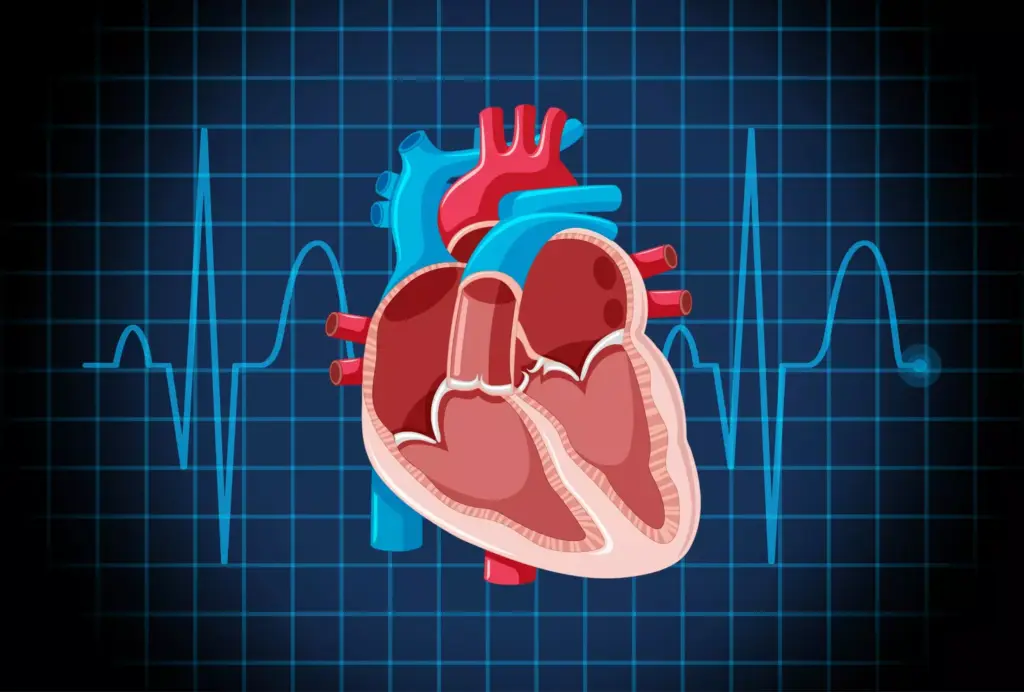
Atrial fibrillation, a common heart arrhythmia, can sometimes cause a cough. This symptom can be worrying. It’s natural to wonder if there’s a connection between the two.
Research shows there is a link between atrial fibrillation (AFib) and cough. While it’s not common, it’s important to know AFib can show up in different ways.
At Liv Hospital, we focus on our patients. We use our knowledge to diagnose and treat conditions well. If you’re worried about a persistent cough and think it might be related to your heart, we’re here to help.
Key Takeaways
- Atrial fibrillation can sometimes cause a cough, though it’s not typical.
- Understanding the link between AFib and respiratory symptoms is key for correct diagnosis.
- Patient-centered care is vital for addressing concerns and effective treatment.
- Liv Hospital offers advanced medical care with a focus on patient needs.
- Seeking medical attention is important if you’re experiencing persistent or concerning symptoms.
The Relationship Between Atrial Fibrillation and Respiratory Symptoms
Atrial fibrillation (AFib) is a heart condition that can cause unexpected respiratory symptoms. Understanding the link between AFib and respiratory issues is key for proper diagnosis and treatment.
Overview of AFib as a Cardiac Condition
AFib is marked by an irregular and often rapid heart rhythm. This can lead to complications like stroke and heart failure. The irregular heartbeat can also affect the body’s other systems, including the respiratory system. Managing AFib is essential to prevent its impact on overall health.
Common and Uncommon Symptoms of AFib
Palpitations, shortness of breath, and fatigue are common AFib symptoms. Some patients may also experience a dry, persistent cough. This cough can sometimes come before more typical AFib symptoms. Other symptoms include dizziness, chest discomfort, or feeling unwell. The variety of symptoms makes diagnosis tricky.
AFib can also cause respiratory symptoms due to poor blood pumping. This can lead to fluid buildup in the lungs, causing coughing or wheezing. Healthcare providers need to understand these symptoms to create effective treatment plans.
Recognizing all symptoms of AFib, including coughing, helps healthcare providers offer better care. This targeted approach improves AFib management and enhances patient quality of life.
What Is AFib Cough? Characteristics and Mechanisms
Understanding AFib cough is key to helping patients with atrial fibrillation. This symptom can greatly affect a patient’s life. It often shows there are heart problems that need attention.
Defining the Dry, Persistent Cough of AFib
The cough from AFib is dry and lasts a long time. It doesn’t produce mucus or phlegm. This is because the heart doesn’t pump blood well, irritating the bronchial tissues.
In AFib, the heart’s upper chambers beat irregularly. This leads to poor blood flow. Fluid builds up in the lungs, irritating the bronchial tubes and causing a cough. The cough’s long-lasting nature is what makes it different from other coughs.
How Cardiac Arrhythmias Affect the Respiratory System
AFib and other heart rhythm problems can harm the lungs. The irregular heartbeat can reduce blood flow to the lungs. This can cause fluid buildup, leading to coughing as the body tries to clear the airways.
Also, the increased pressure in the pulmonary veins can make fluid leak into the lungs. This irritates the lungs and adds to the cough. The link between AFib and cough goes both ways. AFib can cause cough, and coughing can sometimes lead to heart rhythm problems.
The vagus nerve is important for controlling heart rate. It can be triggered by coughing, leading to heart rhythm issues in some people. Knowing how AFib cough works helps doctors find better treatments for both the heart problem and the cough.
Clinical Evidence: Research on AFib and Coughing
Recent studies have uncovered a link between atrial fibrillation (AFib) and coughing. This connection was not well understood before. As research grows, we learn more about how AFib can cause respiratory symptoms.
Scientific Studies Linking Arrhythmia and Cough
Several studies have looked into the connection between AFib and cough. Research has shown that treating AFib can help reduce coughing. For example, a study found that antiarrhythmic treatment cut down coughing in AFib patients.
These studies used different methods, like observational studies and clinical trials. They help us understand how heart arrhythmias and respiratory symptoms are connected. This sheds light on how AFib can cause coughing.
Case Reports of Patients with AFib-Induced Cough
Case reports give us a close look at patients with AFib-induced cough. They show the challenges in diagnosing and treating this condition. They also highlight the benefits of targeted treatment.
For instance, a case report might tell the story of a patient whose cough didn’t respond to usual treatments. But it got better after starting antiarrhythmic therapy for AFib. Such stories are important for diagnosing and treating patients with unexplained cough.
Case reports also show the different ways AFib can cause cough. They help us understand the need for a detailed approach to diagnosis and treatment. By studying these cases, doctors can learn more about the complex relationship between AFib and cough.
The Bidirectional Relationship: When Coughing Triggers Arrhythmias
AFib and coughing are in a cycle where coughing can start arrhythmias. This shows we need to get both heart and breathing issues. It’s a complex mix.
Vagal Stimulation and Its Effect on Heart Rhythm
The vagus nerve controls heart rhythm. Coughing can make this nerve active, which can mess with heart rhythm. Vagal stimulation can change heart rate and rhythm.
Coughing can start arrhythmias by activating the vagus nerve. This nerve release chemicals that can change heart rhythm. Here’s a table about vagal stimulation and heart rhythm.
| Mechanism | Effect on Heart Rhythm | Clinical Implication |
|---|---|---|
| Vagal stimulation through coughing | Potential disruption of normal heart rhythm | Increased risk of arrhythmias in susceptible individuals |
| Release of neurotransmitters | Changes in heart rate and rhythm | Monitoring required for patients with pre-existing heart conditions |
Breaking the Cough-Arrhythmia Cycle
To stop coughing and arrhythmias, we need a full plan. We must tackle both heart and breathing problems. Managing AFib symptoms can help, and treating breathing issues can also help.
Good management includes medicines, lifestyle changes, and sometimes procedures like catheter ablation. By fixing the root causes of AFib and cough, we can end the cycle and help patients.
We stress the need for a complete plan to handle AFib and cough. Knowing how they connect and using the right treatments can greatly improve patients’ lives.
Recognizing AFib Cough: Signs and Symptoms
Knowing the signs of AFib cough is key to getting the right care. Atrial fibrillation (AFib) can cause palpitations, shortness of breath, and fatigue. But a persistent cough is also a big sign of this heart issue.
Distinguishing Features of AFib-Related Cough
An AFib cough is different from other coughs. The cough is usually dry and lasts a long time, sometimes for months. It can get worse at night or when you lie down, making it hard to sleep.
Several things can cause an AFib cough, including:
- Irritation of the vagus nerve, which runs near the heart
- Enlargement of the heart, putting pressure on nearby structures
- Heart failure, leading to fluid accumulation in the lungs
When Cough Occurs Without Other Classic AFib Symptoms
Sometimes, an AFib cough happens without other AFib symptoms. It’s common for patients to have a persistent cough as their main symptom. This can make it hard to diagnose, as doctors might think it’s a lung problem.
To show how AFib cough is different, here’s a table:
| Symptom | AFib Cough | Other Respiratory Coughs |
|---|---|---|
| Nature of Cough | Dry, persistent | Often productive |
| Timing | May worsen at night | Varies |
| Associated Symptoms | May occur with or without classic AFib symptoms | Often accompanied by other respiratory symptoms |
It’s important to know the signs of AFib cough for the right treatment. By spotting the unique signs, doctors can help patients feel better and live better lives.
AFib Cough as a Warning Sign of Heart Failure
Atrial fibrillation (AFib) can show up in many ways. A persistent cough might be a sign of heart failure. It’s key to know how AFib cough can warn of a serious heart issue.
Pulmonary Congestion and Fluid Accumulation
Heart failure can cause pulmonary congestion. This is when fluid builds up in the lungs because the heart can’t pump well. This fluid can irritate the lungs and airways, causing a cough. For people with AFib, this cough is a big problem.
“The development of cough in patients with heart failure is a significant clinical finding that warrants thorough investigation,” notes a study on heart failure symptoms. “It may indicate worsening cardiac function and the need for adjustment in treatment strategies.”
How Heart Failure Exacerbates Respiratory Symptoms
When heart failure and AFib happen together, breathing problems get worse. The heart’s poor function can cause fluid to build up in the lungs and other parts of the body. This makes the situation even more complicated.
| Condition | Effect on Respiratory System | Clinical Implication |
|---|---|---|
| AFib Alone | Potential for irregular heart rhythm affecting lung function | Monitoring for respiratory symptoms |
| Heart Failure Alone | Pulmonary congestion and fluid accumulation | Management of fluid overload |
| AFib with Heart Failure | Exacerbated respiratory symptoms due to combined cardiac dysfunction | Comprehensive management of both conditions |
The connection between AFib, cough, and heart failure shows why a full cardiac check is vital for patients with persistent cough and arrhythmia.
It’s important to understand the link between AFib cough and heart failure for early detection and treatment. Recognizing these signs helps healthcare providers act quickly to help patients.
The Dangers of Misdiagnosis: When AFib Cough Is Mistaken for Respiratory Issues
Misdiagnosing AFib cough as a simple respiratory problem can have serious consequences. Atrial fibrillation (AFib) is a complex cardiac condition. It can show symptoms that look like respiratory diseases. It’s important for healthcare providers and patients to understand the risks of misdiagnosis.
Common Misdiagnoses and Their Consequences
AFib cough is often mistaken for chronic bronchitis, asthma, or other respiratory conditions. This mistake can lead to the wrong treatment. For example, using inhalers or antibiotics that don’t fix the heart problem.
The wrong diagnosis can have serious effects. These include:
- Delayed treatment of AFib, which can make the condition worse
- Using medicines that might not work or could be harmful
- Higher risk of serious problems like stroke or heart failure
- Lower quality of life because symptoms are not treated
A thorough cardiac evaluation is key for patients with persistent cough.
Importance of Cardiac Evaluation for Persistent Cough
A detailed cardiac check is vital for patients with persistent cough. This is true even if other AFib symptoms are not present or are mild. The check should include:
- Taking a detailed medical history to spot AFib risk factors
- Doing an electrocardiogram (ECG) to find arrhythmias
- Using an echocardiogram to look at the heart’s structure and function
- Watching for AFib episodes, as the condition can be unpredictable
By focusing on cardiac evaluation, we can lower the chance of misdiagnosis. This ensures patients get the right treatment for AFib cough on time.
Diagnostic Approaches for Suspected AFib Cough
At Liv Hospital, we use a detailed process to find AFib cough. We look at both heart health and breathing. Our goal is to give top-notch medical care to our patients.
Cardiac Evaluation Methods
To find AFib cough, we start with a heart check. This includes:
- Electrocardiogram (ECG) to spot heart rhythm problems
- Echocardiogram to check the heart’s shape and how it works
- Holter monitoring for long-term heart rhythm tracking
- Stress test to see how the heart works when stressed
These tests help us understand the heart issue and how it might affect breathing.
Respiratory Assessment Techniques
We also use special tests to check breathing for AFib cough. These include:
- Pulmonary function tests (PFTs) to see how well the lungs work
- Chest X-ray or CT scan to look at lung structure and find issues
- Arterial blood gas analysis to check oxygen and breathing levels
By looking at both heart and breathing, we can find AFib cough and plan the best treatment.
Our team works together to give patients the best care. We focus on both heart and breathing problems of AFib cough.
Treatment Strategies That Reduce AFib Cough
Managing AFib cough requires a mix of medicines and procedures. We’ll see how these methods help patients with atrial fibrillation feel better.
Antiarrhythmic Medications and Their Effect on Cough
Antiarrhythmic drugs are key in treating AFib symptoms, like cough. They help control the heart’s rhythm, cutting down on coughing.
Common Antiarrhythmic Medications:
- Flecainide
- Propafenone
- Sotalol
- Amiodarone
These drugs stabilize the heart’s electrical activity. This reduces cough triggers. But, the right drug varies by patient.
| Medication | Mechanism of Action | Common Side Effects |
|---|---|---|
| Flecainide | Class IC antiarrhythmic; slows conduction velocity | Dizziness, headache |
| Propafenone | Class IC antiarrhythmic; slows conduction velocity | Dizziness, metallic taste |
| Sotalol | Class III antiarrhythmic; prolongs repolarization | Fatigue, bradycardia |
| Amiodarone | Class III antiarrhythmic; prolongs repolarization | Thyroid dysfunction, pulmonary toxicity |
Catheter Ablation and Other Interventional Approaches
Catheter ablation is an option for some. It uses energy to destroy heart tissue causing AFib.
Benefits of Catheter Ablation:
- Potential for long-term AFib control
- Reduction in symptoms, including cough
- Minimally invasive procedure
A leading cardiologist says, “Catheter ablation is a top treatment for AFib. It helps patients lessen symptoms and live better.”
“Catheter ablation is a game-changer for many AFib patients, providing a more definitive treatment option beyond medication alone.”
Other treatments include pacemakers or surgery. The best option depends on the patient’s situation and AFib severity.
Knowing about treatment options helps AFib cough patients work with doctors. The right antiarrhythmic treatment often cuts down coughing, improving life quality.
Living with AFib: Managing Chronic Cough Symptoms
Living with AFib means dealing with irregular heartbeats and chronic cough. For many, a persistent cough makes daily life hard. It affects their quality of life in big ways.
Lifestyle Modifications to Reduce Symptom Burden
Making lifestyle changes can help with AFib symptoms, like chronic cough. Here are some tips:
- Staying Hydrated: Drinking lots of water helps thin out mucus, making it easier to cough up.
- Avoiding Irritants: Avoiding smoke, dust, and strong smells can help reduce cough triggers.
- Maintaining a Healthy Weight: Being overweight can strain the heart, making AFib symptoms worse.
- Exercise Regularly: Gentle exercises like walking or yoga can improve heart health without overdoing it.
By making these lifestyle changes, patients can lessen their AFib symptoms, including chronic cough.
Coping Strategies and Support Resources
Coping with AFib and its symptoms needs a wide approach. There’s more to it than just medical treatment. Patients can find help in various ways.
| Coping Strategy | Description | Benefit |
|---|---|---|
| Mindfulness and Relaxation | Practices like meditation and deep breathing exercises. | Reduces stress, potentially lowering AFib episodes. |
| Support Groups | Joining groups of people with similar experiences. | Provides emotional support and practical advice. |
| Patient Education | Understanding AFib, its management, and treatment options. | Empowers patients to take an active role in their care. |
Using these coping strategies and support resources can help manage AFib better. It can improve overall well-being.
When to Seek Emergency Care for AFib Cough
Knowing when to get emergency care for AFib cough is key for those with atrial fibrillation. A persistent cough can be annoying, but it might also mean a serious issue that needs quick help. We’ll show you the warning signs that mean you should go to the emergency room right away. Plus, we’ll give tips on talking to your doctors.
Red Flag Symptoms Requiring Immediate Attention
Some symptoms with AFib cough need you to get medical help fast. These include:
- Severe difficulty breathing or shortness of breath that gets worse over time.
- Chest pain or discomfort that spreads to the arms, back, or jaw.
- Severe dizziness or fainting spells.
- Coughing up blood or rust-colored mucus.
- Rapid or irregular heartbeat that is severe or comes with other symptoms.
As one study found, “Patients with AFib often have many symptoms. It’s important to know how serious these symptoms are to get help quickly.”
“The presence of red flag symptoms such as severe dyspnea or chest pain should prompt immediate evaluation in an emergency setting.”
Communicating Effectively with Healthcare Providers
When you see a doctor for AFib cough, it’s vital to talk clearly with them. Here are some tips:
- Be detailed about your symptoms: Tell them when your cough started, how long it lasts, and what it feels like. Also, say what makes it better or worse.
- List your medications: Give them a full list of what you’re taking, including how much and how often.
- Mention any recent changes: Tell them if anything new has happened with your symptoms or condition.
- Ask questions: It’s okay to ask about your diagnosis, treatment options, and what to expect.
Talking well with your healthcare team can really help your care. As doctors say, “Good communication between patients and healthcare providers is key to the best care.”
By knowing the warning signs and how to talk to your doctors, you can get the right care when you need it.
Conclusion: Understanding the Importance of AFib Cough Recognition
It’s key to know how atrial fibrillation (AFib) and cough are connected for better patient care. We’ve looked into how AFib and breathing problems are linked. We’ve also talked about what makes AFib cough different.
Spotting AFib cough early is important because it might signal heart problems like heart failure. Knowing about AFib cough helps doctors find and help patients who are at risk.
Recognizing AFib cough is also critical for finding the right treatments. We’ve talked about medicines and procedures like catheter ablation. These can help reduce symptoms and make patients feel better.
As we learn more about AFib cough, we must work together in patient care. This team effort is key to giving patients the best care for AFib.
Getting to know AFib cough is essential for top-notch patient care. By understanding its role, we can do a better job of diagnosing and treating patients. This leads to better health outcomes for everyone.
Can atrial fibrillation cause a persistent cough?
Yes, atrial fibrillation (AFib) can lead to a persistent cough. The irregular heartbeat can cause fluid to build up in the lungs, leading to coughing.
What are the characteristics of AFib-related cough?
AFib-related cough is usually dry and lasts a long time. It can happen without other signs of AFib, making it hard to diagnose.
How does AFib affect the respiratory system?
AFib can cause fluid to build up in the lungs, leading to coughing. The irregular heartbeat can also affect the vagus nerve, possibly causing more arrhythmias.
Can coughing trigger AFib episodes?
Yes, coughing can trigger AFib episodes by stimulating the vagus nerve. This creates a cycle between AFib and coughing.
How is AFib cough diagnosed?
Diagnosing AFib cough requires a detailed cardiac check-up. This includes electrocardiograms and echocardiograms. Respiratory tests like chest X-rays and pulmonary function tests are also used.
What are the treatment options for AFib cough?
Treatments for AFib cough include medications and procedures like catheter ablation. Making lifestyle changes and finding coping strategies can also help manage the cough.
Can AFib cough be a sign of underlying heart failure?
Yes, AFib cough can signal heart failure. Fluid buildup in the lungs can worsen breathing problems, making it important to seek medical help quickly.
When should I seek emergency care for AFib cough?
Go to the emergency room if you have severe shortness of breath, chest pain, or dizziness. It’s important to talk openly with your healthcare team.
How can I manage chronic cough symptoms with AFib?
To manage chronic cough with AFib, try lifestyle changes and avoid triggers. Also, use coping strategies and seek support.
Can misdiagnosis of AFib cough lead to delayed cardiac care?
Yes, thinking AFib cough is just a lung problem can delay heart care. A full cardiac check is key to diagnose and treat it properly.
Are there any specific lifestyle changes that can help alleviate AFib cough?
Yes, changes like keeping a healthy weight, exercising, and managing stress can help reduce AFib cough symptoms.











